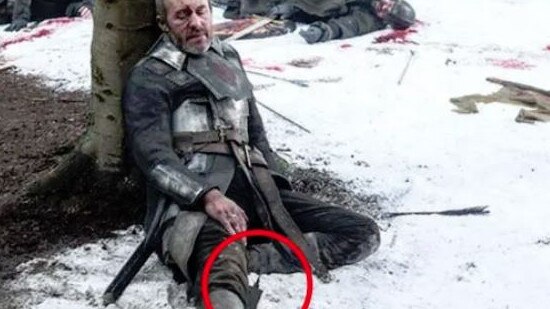The age of making innocent mistakes is over
What’s worse than realising a rogue coffee cup has made it into the shot of your medieval fantasy show viewed by millions? Having the world mercilessly ridicule you for it, obviously, writes Karen Brooks.
Rendezview
Don't miss out on the headlines from Rendezview. Followed categories will be added to My News.
The old adage, “everyone makes mistakes” is fast becoming a forgotten axiom as, increasingly, people are not only being held to account for minor mistakes they make and often publicly shamed and mocked, but their entire body of work and professional reputations are being called into question.
RELATED: Game of Thrones writer reveals one character was originally going to live
The most recent and very public example were two anachronistic errors eagle-eyed fans spotted in the final series of Game of Thrones. Labelled #coffeegate (a Starbucks cup appeared in episode 4) and Watergate 2019 (two plastic water bottles stood at the feet of characters in a scene) they created a social media storm.
These production boo-boos also made international headlines.

While most of the responses were hilarious and understanding, there were those prepared to denigrate and even dismiss the entire series on the basis of these arguably — in the scheme of things — minor mistakes.
Fans on Twitter posted comments like “this show is a joke!” and lamented it had “failed all its fans”, was “sloppy” and accused the program’s final season of “lazy storytelling” and “phoned-in production work” by the “worst departments” — writing and editing.
MORE FROM KAREN BROOKS: Game of Thrones: A better show we couldn’t have asked for
While these oversights effectively catapulted those who saw them out of the GoT experience, reminding them it was “just a show”, did they warrant such outrage? To have eight years of viewing pleasure, unprecedented praise and spectacular acting being disdained and discounted?
Similar reactions occur when spelling or grammar errors appear in a piece of writing.
There are those who take great pleasure in correcting mistakes via letters/emails to the publisher/editor/paper/writer or tweets. Having been on the receiving end, I can report it’s equally mortifying and frustrating, often because you take great care to ensure there aren’t any — hence the word “mistake”.
According to the Cambridge Dictionary, mistake means “an action, decision or judgment that produces an unwanted or unintentional result”. In other words, it’s unwitting. Not that this stops the Grammar Police or Blunder Bobbies from moving in, shaming the people/production/business involved and passing sentence.
MORE FROM KAREN BROOKS: ‘Fake news’ — How did it come to this?
So often, writers (anyone from writers of advertorials to menus) get haughty communications from people who feel it’s their job (and right) to point out any errors they find. Disregarding the content of what they’re criticising, the thrust of the argument/themes/characters or work that’s clearly gone into it, or the speed at which it’s been produced to meet deadlines and relevance, they focus on errors and denigrate the author, their professional capabilities, and the industry they work for.

A study by the University of Michigan in 2016 proved what many of us have long suspected: “Grammar Nazis”, as they’re colloquially known are, not only introverts but, as one reporter put it, “jerks”. Writing on the study for Tech Insider, Chris Weller argued, “people who correct other people’s typos can be some of the biggest nuisances around — not just because they’re pointing out flaws, but for the added conceit of thinking they’re doing you a favour”.
MORE FROM KAREN BROOKS: Banning best friends does more damage than good
These kinds of people exist in all professions — those who believe they’re casting pearls before swine, take it upon themselves to lecture and thus educate others on how to do their job by pointing out your errors. It’s a form of power and control, setting standards by their yardstick and ensuring others adhere to it through public degradation and even insult.
While those who make mistakes hope to learn from them, what do those who point them out gain? As the American writer and poet, Nikki Giovanni says, “Mistakes are a fact of life. It is the response to error that counts.”
Dr Karen Brooks is an honorary senior researcher at IASH at the University of Queensland.
For the latest from RendezView, follow us on Facebook and Twitter.


